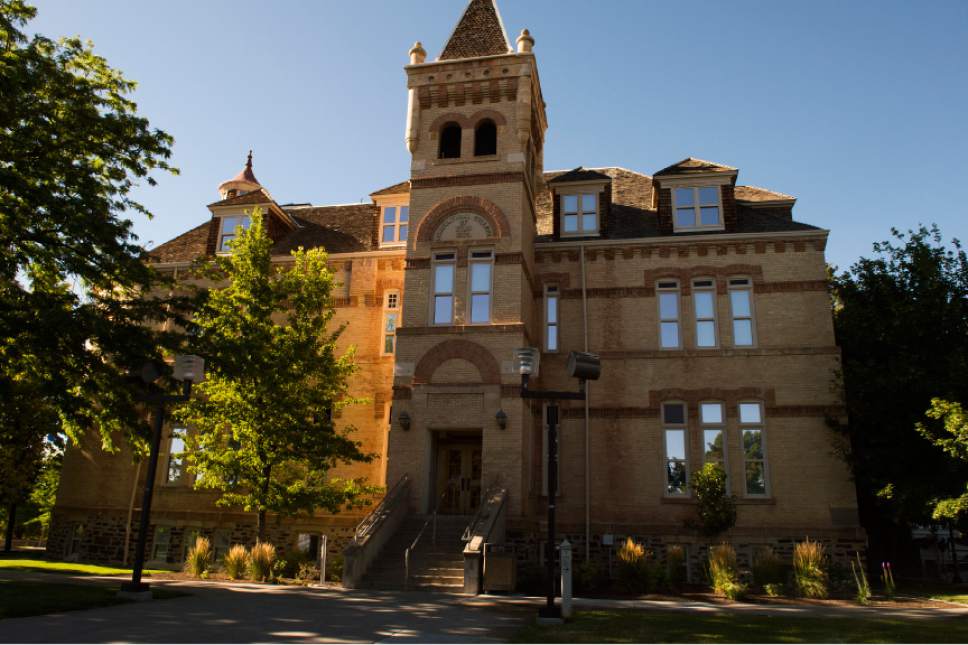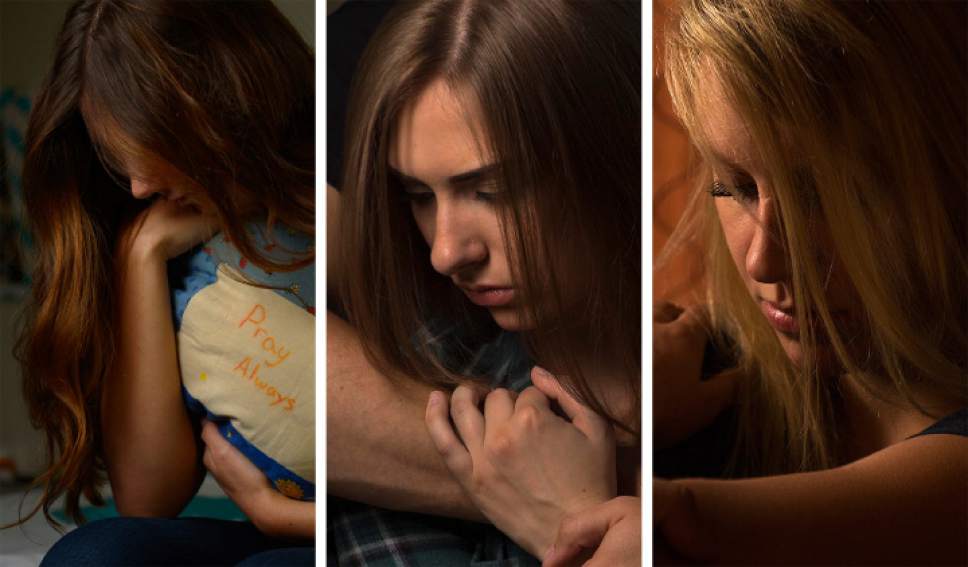This is an archived article that was published on sltrib.com in 2016, and information in the article may be outdated. It is provided only for personal research purposes and may not be reprinted.
Former Utah State University linebacker Torrey Green was charged Thursday in five separate criminal cases, accused of raping or sexually assaulting five women in two years in Cache County.
Green, 22, was charged in 1st District Court with four counts of first-degree felony rape, as well as first-degree felony aggravated kidnapping and second-degree felony forcible sexual abuse.
The Cache County Attorney's Office said it investigated nine separate allegations.
Four of those alleged victims went to police in 2015, and their stories were reported by The Salt Lake Tribune in July. Thursday's charges involve three of those women, plus two women who appear to have reported to police since July.
Green was arrested Thursday in California.
If convicted of any of the rape or kidnapping charges, Green faces a maximum penalty of up to life in prison, while the sex abuse count carries a maximum penalty of one-to-15-years behind bars.
The charges describe attacks between November 2013 and November 2015. Three cases were investigated by North Park Police, according to court records, while two were handled by the Logan Police Department.
Court dates likely won't be scheduled until Green is extradited to Utah to face the charges.
Zack Teperman, of Los Angeles-based ZTPR, represents Green and had no immediate comment. He has previously said Green "has complete faith that any further investigation will prove his complete innocence and he will be exonerated."
Green began classes at Utah State in 2011, has since graduated and remained on campus through spring 2016. In April 2016, he signed a free agent contract with the Atlanta Falcons. The NFL team waived him in August after learning that he was the subject of multiple sex assault investigations.
In July, Cache County prosecutors began re-examining the cases reported in 2015. Those investigations had languished and two of the cases had not been sent to prosecutors, according to police reports accessed by The Tribune in May.
Court documents included these descriptions of the alleged assaults:
• In November 2013, a woman, identified as "M.H." in court papers, alleges that Green raped her in his North Logan apartment. She told North Park police officers on Sept. 2, 2016, that she met Green on the dating app Tinder, and they met for the first time in a public setting on campus, according to an arrest warrant affidavit. She found him "charming and cute," she told police, and she later went to his apartment where he made her dinner.
M.H. reported that Green then took her into his bedroom, where they watched a movie and he gave her a shoulder massage. When he tried to lift up her shirt, the woman told him no and got off the bed, according to the affidavit.
The woman told police that Green then took off her clothing, got her back onto his bed and raped her.
"She continued telling Torrey to stop and that she didn't want him to do this to her," North Park Police Chief Kim Hawkes wrote in the affidavit. "… At one point, Torey asked her if she was scared, she replied to him that she was."
M.H. told a friend about the alleged assault, according to the affidavit, but did not tell anyone else "until recently when one of her friends brought up Torrey's name because of something they saw in the paper."
• On Oct. 24, 2014, a woman identified in court documents as "L.P." told police, Green assaulted her while they were watching a movie in Green's bedroom.
During the movie, Green tried repeatedly to kiss and touch her, L.P. said, and became upset when she refused him. The woman said Green pinned her to his bed by holding her from behind, though at some point he stopped moving and she believed he might have fallen asleep. L.P. was able to leave the bed, she told police, and was going to her purse to get pepper spray when Green got up and pushed her into a bathroom adjacent to his bedroom.
The woman told officers that Green forced her legs apart and began grinding his body against hers; both remained clothed. L.P. asked Green to stop and told him she wanted him to take her home, but Green allegedly refused. L.P. was able to leave the bathroom, according to the affidavit, but Green pinned her to a wall and continued grinding against her.
"L.P. said she was asking Torrey what his mom would think if she knew what he was doing to her," Hawkes wrote. "L.P. stated Torrey told her that she wasn't worth his time and he stopped his forceful advances. … Torrey finally agreed to take her home."
Green is charged with kidnapping and forcible sexual abuse against L.P.
The three other assaults alleged in the charges mirror what three women — Catherine, Anna and Debbie — reported to police in 2015 and told The Tribune this year. The Tribune generally does not name victims of sex crimes, and the women asked to be identified by first names or pseudonyms.
• In January 2015, Catherine told police Green first approached her at the Taggart Student Center and asked for her number. On the night of the alleged attack, he took her back to his apartment, where they watched television until he started taking her clothes off. She said no, but he overpowered her and raped her, the charges state. She went to police within a week.
• In late May or early June 2015, Anna said she met Green on Tinder, and within days he called at 2 a.m. to say he was near her apartment. He followed her to her bedroom and she ended up on the floor, she said. Green then raped her, the charges state. She did not report to Logan police until November 2015.
• Days after Anna reported the assault, in November 2015, Debbie was at a party at Green's apartment. She had been drinking before Green locked her in his bedroom and raped her, she told police.
• No charges were filed in connection with Mary, who told The Tribune and police that Green also assaulted her in November 2015.
She said Thursday she is "perfectly fine" with not being included in the prosecution. "All I wanted was for no one else to go through what any of the others went through," she said.
Mary, Catherine and Anna attended USU at the time of their alleged attacks, and all say they reported to the university in addition to police. M.H. also was a student, but it's unclear if she told anyone at the school.
But it appears that the school — though federally mandated to take action if there is a potential continuing threat to students — did not fully investigate the allegations or sanction Green, who played in all 13 games during the 2015 season.
Utah State spokesman Tim Vitale said Thursday that the school is "waiting for more information but we do look forward to these cases being brought to resolution." The school's athletic department referred questions to Vitale.
The university conducted an internal investigation into the allegations and its sexual-assault policies after The Tribune's July story. It has since launched a "Consent Is" campaign; is developing an information-sharing agreement with local law enforcement and community groups; is working on changes to the student code related to confidentiality; and is clarifying mandatory reporting and anonymous reporting policies.
Debbie was not a USU student, and it's unclear if L.P. was a student.
Utah does not have a statute of limitations on rape charges and prosecutors have said they plan to use a law known as the doctrine of chances which allows them to admit evidence showing that it's not likely the defendant would innocently and repeatedly be involved in similar situations.
Green denied the initial four allegations in an interview with The Tribune in July, saying it was "blown out of proportion." He also said the school talked to him about one incident, which he did not specify.
"I don't get why you're trying to make a story right now on a person that's trying to be successful, on stuff that I dealt with a while back," he said. "Why would you want to mess up someone's career like that?"
David LaBahn, president and CEO of the Association of Prosecuting Attorneys, told The Tribune it's unusual for prosecutors to re-examine cases after so much time has passed. It's also unusual that so many additional women would come forward, he said.
"This is a one-in-a-million type of case," LaBahn said.
Twitter: @alexdstuckey
— Tribune reporter Benjamin Wood contributed to this story





